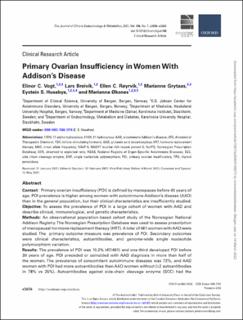| dc.contributor.author | Vogt, Elinor Margrethe Chelsom | |
| dc.contributor.author | Breivik, Lars Ertesvåg | |
| dc.contributor.author | Røyrvik, Ellen Christine | |
| dc.contributor.author | Grytaas, Marianne | |
| dc.contributor.author | Husebye, Eystein Sverre | |
| dc.contributor.author | Øksnes, Marianne | |
| dc.date.accessioned | 2022-04-12T09:40:03Z | |
| dc.date.available | 2022-04-12T09:40:03Z | |
| dc.date.created | 2021-07-07T14:36:28Z | |
| dc.date.issued | 2021 | |
| dc.identifier.issn | 0021-972X | |
| dc.identifier.uri | https://hdl.handle.net/11250/2991042 | |
| dc.description.abstract | Context: Primary ovarian insufficiency (POI) is defined by menopause before 40 years of age. POI prevalence is higher among women with autoimmune Addison’s disease (AAD) than in the general population, but their clinical characteristics are insufficiently studied.
Objective: To assess the prevalence of POI in a large cohort of women with AAD and describe clinical, immunological, and genetic characteristics.
Methods: An observational population-based cohort study of the Norwegian National Addison Registry. The Norwegian Prescription Database was used to assess prescription of menopausal hormone replacement therapy (HRT). A total of 461 women with AAD were studied. The primary outcome measure was prevalence of POI. Secondary outcomes were clinical characteristics, autoantibodies, and genome-wide single nucleotide polymorphism variation.
Results: The prevalence of POI was 10.2% (47/461) and one-third developed POI before 30 years of age. POI preceded or coincided with AAD diagnosis in more than half of the women. The prevalence of concomitant autoimmune diseases was 72%, and AAD women with POI had more autoantibodies than AAD women without (≥2 autoantibodies in 78% vs 25%). Autoantibodies against side-chain cleavage enzyme (SCC) had the highest accuracy with a negative predictive value for POI of 96%. HRT use was high compared to the age adjusted normal population (11.3 % vs 0.7%).
Conclusion: One in 10 women with AAD have POI. Autoantibodies against SCC are the most specific marker for autoimmune POI. We recommend testing women with AAD <40 years with menstrual disturbances or fertility concerns for autoantibodies against SCC. | en_US |
| dc.language.iso | eng | en_US |
| dc.publisher | Oxford University Press | en_US |
| dc.rights | Attribution-NonCommercial-NoDerivatives 4.0 Internasjonal | * |
| dc.rights.uri | http://creativecommons.org/licenses/by-nc-nd/4.0/deed.no | * |
| dc.title | Primary ovarian insufficiency in women with Addison's disease | en_US |
| dc.type | Journal article | en_US |
| dc.type | Peer reviewed | en_US |
| dc.description.version | publishedVersion | en_US |
| dc.rights.holder | Copyright 2021 The Author(s) | en_US |
| cristin.ispublished | true | |
| cristin.fulltext | original | |
| cristin.qualitycode | 2 | |
| dc.identifier.doi | 10.1210/clinem/dgab140 | |
| dc.identifier.cristin | 1920754 | |
| dc.source.journal | Journal of Clinical Endocrinology and Metabolism (JCEM) | en_US |
| dc.source.pagenumber | e2656-e2663 | en_US |
| dc.relation.project | Norges forskningsråd: 288022 | en_US |
| dc.relation.project | Stiftelsen Kristian Gerhard Jebsen: KGJ senter for autoimmune sykdommer | en_US |
| dc.relation.project | Norges forskningsråd: 262677 | en_US |
| dc.identifier.citation | Journal of Clinical Endocrinology and Metabolism (JCEM). 2021, 106 (7), e2656-e2663. | en_US |
| dc.source.volume | 106 | en_US |
| dc.source.issue | 7 | en_US |

